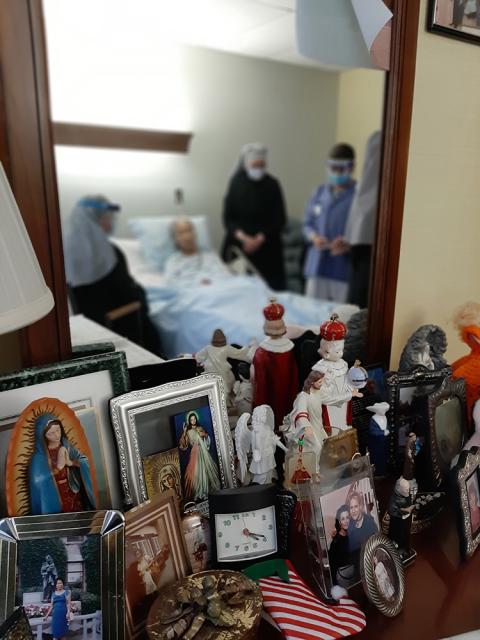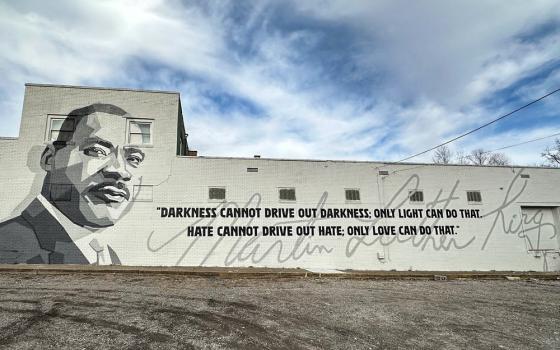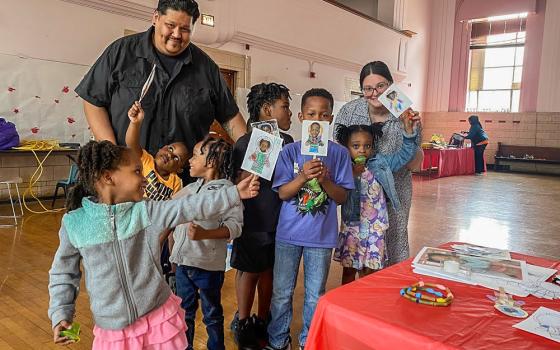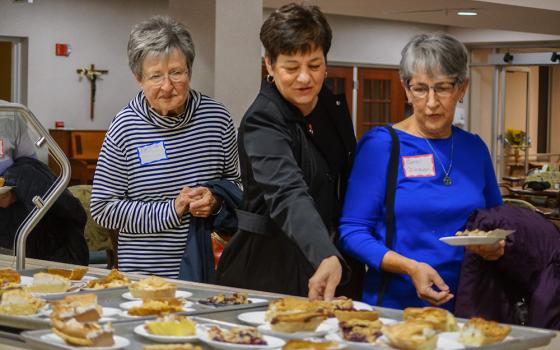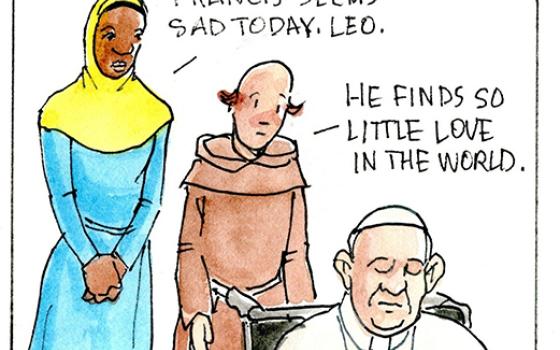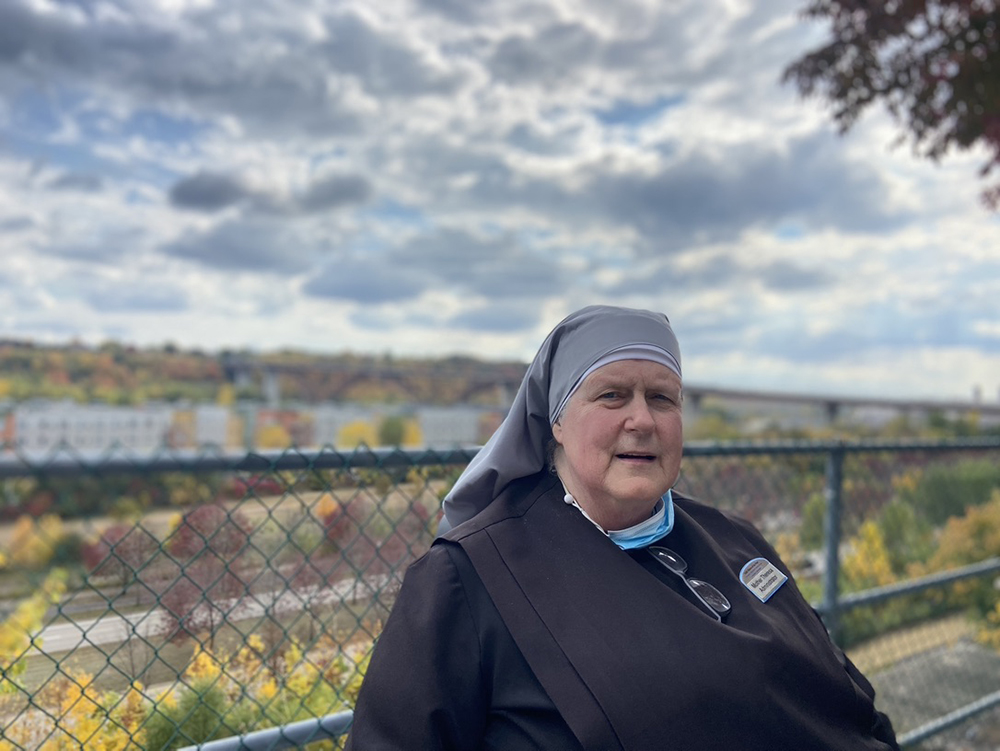
Mother Theresa Gertrude of the Little Sisters of the Poor (Anna Wilgenbusch)
In her 52 years as a Little Sister of the Poor, Mother Theresa Gertrude has accompanied countless individuals in their final months on Earth.
She didn't expect to be a sister, let alone one who has a special vocation to the dying.
But when she graduated high school in San Francisco, she felt a tugging on her heart to live with the Little Sisters of the Poor, for whom she had volunteered for four years. She thought that perhaps the lived experience of religious life would rid her of the idea.
Living with the sisters only intensified her call. She entered the mendicant order at age 19, joining its mission to care for the elderly and dying.
The Little Sisters of the Poor were founded in the mid-19th century after a young nurse, St. Jeanne Jugan, gave her bed to a paralyzed older woman whom Jugan saw suffering alone in the street. As more elderly people requested her help and more young women joined her to serve them, the women were established as a religious order in France, according to the Little Sisters' website.
They came to America in 1868 and established the house in Minnesota, where Mother Theresa Gertrude now serves as superior, in 1883.
Advertisement
Mother Theresa Gertrude went to the order's motherhouse in France for 16 months of formation shortly after she joined the order, which she described as a "beautiful, international experience."
After serving in various assignments across the United States, in 2014, she was assigned to Los Angeles, where she served as mother superior for seven years, including during the brunt of the COVID-19 pandemic.
The pandemic majorly disrupted the lives of the staff and residents of the Little Sisters of the Poor. Mother Theresa Gertrude spoke with Global Sisters Report about how COVID-19 changed the dynamics of death and grieving for residents, families and staff.
GSR: What was it like spiritually for residents to be isolated during COVID-19?
Mother Theresa Gertrude: That was very, very, very difficult, because for a good while we could not have Mass — in San Francisco, you could not have public gatherings — so we would have a Communion service and the prayers over the public address system. There would be three different sisters going to the units to distribute Communion. The staff really learned to respect that time, and the residents would be in their doorway and receive Communion.
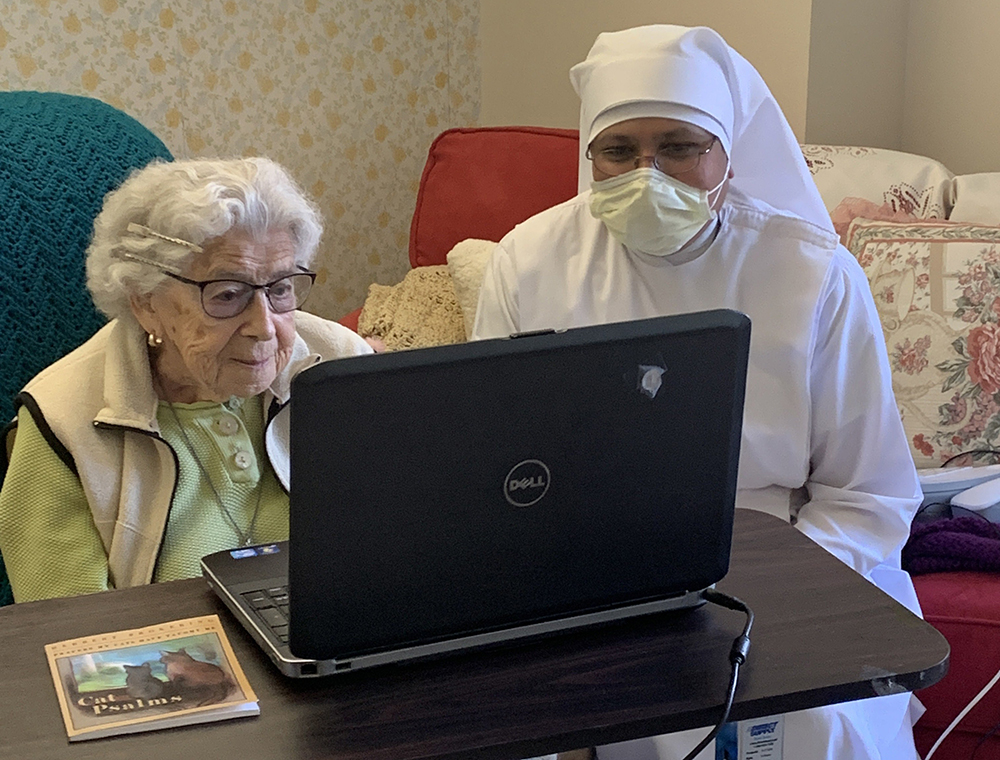
A Little Sister of the Poor helps a resident connect with family in Rhode Island. (Courtesy of the Little Sisters of the Poor)
What was the most difficult part of COVID?
One of the most challenging things was that when people would still die — not of COVID, but of old age — we always accompany someone right up to death, but most of our residents would want to have their funeral in the home with a funeral Mass, and we could not do that. And so there was no closure. You usually have a wake, when the residents and staff could say goodbye, but that was a terrible void.
What does that closure usually provide?
It's a comfort. For the residents, it's saying goodbye to your friend, going to their Mass and celebrating their life. For the family, it is a closure, also. So often, that could not happen for over a year.
Ninety-five percent of people used to have their funeral at the [Little Sisters of the Poor] home, and that just stopped. You saw a gurney going out, and that was the last time you ever saw them.
How does a lack of closure affect the grieving process?
It somewhat hindered it and thwarted it. It was just abruptly cut off, the grieving process. I think there is something to wakes and something to family gatherings, and there is something to the celebration of someone's life. We could talk about them and pray, but there is something about having the visible presence there, having a viewing, having the family gather to be able to even thank their caregivers and the caregivers giving their condolences — that was all stopped.
And that was a great void. Personally, I found that one of the hardest things.
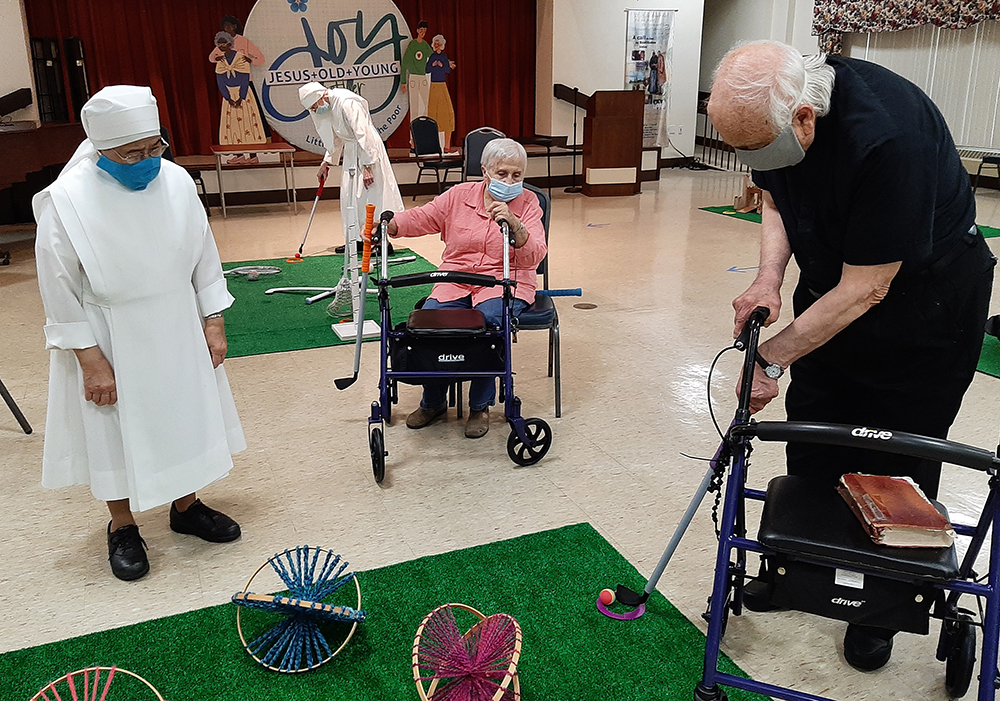
Little Sisters of the Poor golf with residents in Washington in 2020. (Courtesy of the Little Sisters of the Poor)
Can you speak about the beauty that you find in working with the elderly and walking with people who are dying and their families?
That is probably one of the most privileged parts of our vocation, to be able to accompany a resident on their journey to the Lord. We are very much palliative care. We invite a family to vigil with them.
It's something you will never forget if you've had the opportunity of accompanying someone on their last journey — to pray with them, to tell them you love them, to tell them you'll miss them, to ask them before the throne of God to intercede for us. It's beautiful.
What have you learned about how to grieve for someone over the course of your vocation?
Grief is different in each individual. We have the faith — we believe in the afterlife.
It's always sad when someone dies. But if you are 95 and you've been suffering with cancer and whatnot, it is a natural part of life. It is the natural ending of life, and you are going home to God, and your good deeds are going with you. And maybe for someone who has not lived the most wonderful life, maybe they have time then to reconcile with the Lord, reconcile with their family.
I think a young, unexpected death is much more tragic. But for us, it is a natural part of living. We are all made to go to heaven. The Lord creates, the Lord sustains, and the Lord calls us back.
Do you think that in our culture today, there is a resistance to talking about death?
I think there is a great resistance. There is a great resistance because there is a great crisis of faith.
Our faith helps us not only endure, not only survive, but we know that the only way to Christ is through the cross, and it does give consolation knowing that God is always there with us.
We might not feel it; we might be like Job [saying], "Why did you do this? Why did you allow this?" But to have the faith that God will sustain us, God is there, God is ever-faithful — [like in] the whole Old Testament — that is what sustains us, and that is what sustains a generation that believes that.
They have the faith. They believe that Jesus is in the Blessed Sacrament.
How does having faith change the experience of dying, in what you've witnessed?
Well, they'll say, "I'm ready to go." They'll say that they are waiting for the Lord to call them home. It's not depression. They are longing to see their loved ones.
But sometimes, the family is not ready to let them go.
How do you help a family prepare for the death of their loved one?
Accompanying them. I think sometimes, it is the shock of suddenness. Even though someone might be sick, if they are dying, it feels so final, because it is.
We accompany them, we pray with them, the unsettled business gets settled. The reconciliations that maybe need to take place take place. The goodbyes that are very long and struggling and heartfelt, if they have time to do that, acceptance comes. It is never easy, but you work toward that.
The human aspect is always there, but it is faith that gets us through so much. The human aspect — that we are going to miss our loved ones — is a painful process; it is almost a wrenching process. But if we have faith, and if we believe that we will see them again with the Lord, I think that consoles a lot of people.
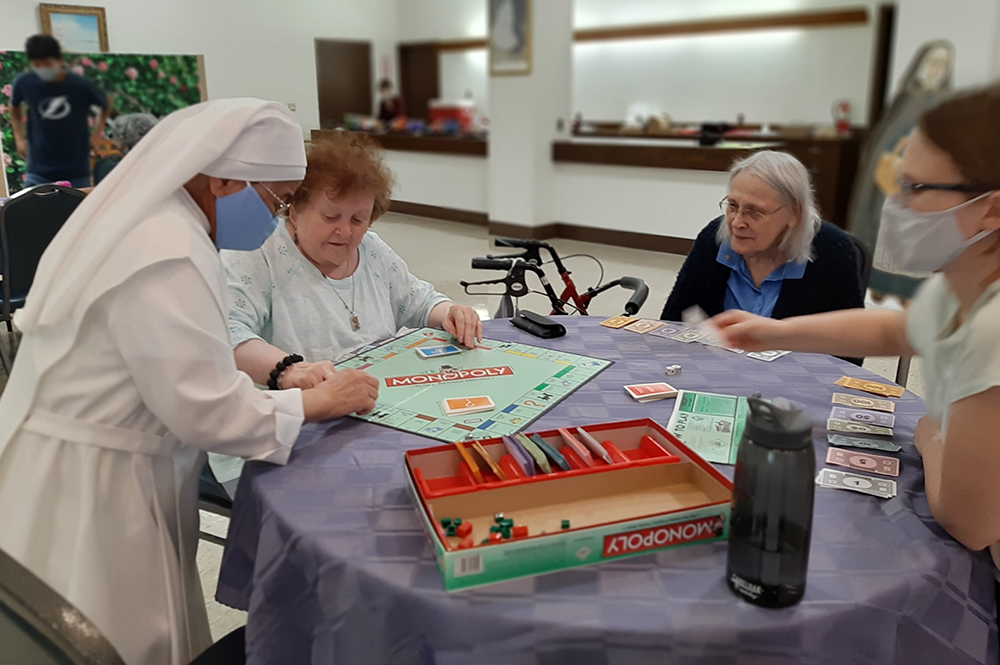
A Little Sister of the Poor plays Monopoly with residents in Washington in 2021. (Courtesy of the Little Sisters of the Poor)
What would you say to someone who doubts the value of their life and suffering at the end of their journey?
The people who want assisted suicide are afraid of pain, which can be controlled; they're afraid of their life being useless or of being a burden financially and a caregiving burden. It is our great joy and great privilege to try to help people work through this.
It takes prayer. We pray that the Holy Spirit speaks through us to assure them that we are here for them, that this is our vocation, and that it is our privilege to care for them.
A lot of the time, it is the pain behind there, the suffering that gives someone the reaction of "I want to end it all." And nobody should have to have excruciating suffering. The physiological pain nor the spiritual pain — this is what we try to work with.
What things will be different at Little Sisters of the Poor residences after COVID?
I just want to do a couple positive things on COVID because you don't hear many positive things.
One of the things I found for COVID was that, after the initial absolute fright of COVID and after things calmed down and there were protocols in place and all of that, I saw a wonderful, wonderful response of teamwork. We sisters noticed that among ourselves even more because you didn't have some of the ancillary help you had before. Everyone was willing to do whatever needed to get done so that the residents were happy.
For the sisters, it was another opportunity — since we were short on people — we were really able to practice our hospitality to the nth degree.
I think we have to find a little silver lining in everything. It just reminded each Little Sister of why we're here. This brought you right back to: I'm here as a caregiver.

